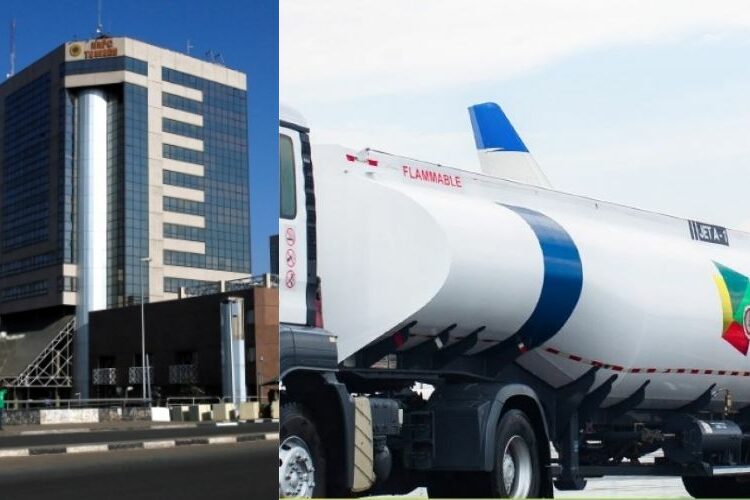There are indications that the current prices of Premium Motor Spirit (PMS) from Dangote Refinery are priced under subsidy considerations.
The Nigerian National Petroleum Company Limited (NNPC) has been procuring the product from the refinery to ensure availability across the country.
This may be why oil marketers cannot import petrol or buy directly from Dangote Refinery, as it is not profitable or cost-effective for them to do so.
NNPCL’s executive vice president, downstream sector, Adedapo Segun, told newsmen that no marketer has been precluded from importing petrol, but they are unwilling to do so because the market conditions are unfavourable for them.
He said, “Marketers receive approval from the Nigerian Midstream and Downstream Petroleum Regulatory Authority (NMDPRA) to import automotive gas oil (AGO), aviation turbine kerosene (ATK), and petroleum motor spirit (PMS).
“They then assessed the market indices and discovered that PMS is still being sold below cost. If they import it, they would incur losses. As a result, they only bring in AGO and ATK.
“They do not import PMS because the market remains unviable for them. It is not that NNPC wishes to be the sole importer or provider of PMS; rather, other marketers will not proceed if it is not profitable,” he explained.
According to the NNPCL executive, marketers cannot purchase petrol directly from Dangote Refinery because the product is still being sold at a subsidised rate.
“The same situation applies to Dangote Refinery’s petroleum. Dangote is a company and will sell at market price. The market value of PMS is still higher than the price at which NNPC is selling. Therefore, there is no incentive for marketers to buy from Dangote.”
He noted that NNPC’s off-taking occurs solely because others will not purchase at the price Dangote is willing to accept, which is reasonable.
“As soon as the price allows, you will see marketers going to Dangote to make purchases. Rather than claiming that NNPC is the only off-taker, we should say that NNPC is the only entity willing to off-take because it has a legal obligation to act as the energy provider,” he said.
Industry analyst Adamu Ismaila, however, expressed concern regarding Dangote management’s refusal to disclose the price at which it sells the product to NNPC.
Ismaila argued that while disputing NNPCL’s claims that it purchased the product from the refinery at N898 per litre, Dangote Refinery has failed to disclose the actual amount it sold its fuel to NNPCL.
Curious Nigerians have, therefore, been wondering why it is hard for Dangote Refinery to reveal how much it charges NNPCL for its product.
Some analysts suggest that this situation mirrors the monopoly trend for which Dangote has often been accused, although he has consistently denied such claims.
In response to Dangote Refinery’s rebuttal, NNPCL provided a detailed explanation of how it arrived at the N898 per litre price.
The company stated that the refinery’s quoted gantry price per tonne was $736, which equates to $0.55 per litre. At the official exchange rate of N1,637.59 per dollar, this amounts to N898.78 per litre in naira terms.
NNPCL further noted that statutory charges, such as the NMDPRA fee, inspection fees, distribution costs, and a profit margin, would be added to the landing cost of PMS to determine the pump price.
The charges include the NMDPRA fee (N8.99), inspection fee (N0.97), distribution cost (Lagos) (N15.00), and profit margin (N26.48). According to NNPCL, once these additional charges are factored in, the cost per litre of petrol in Lagos is projected to be N950.22, while prices in other parts of the country will vary due to transportation and distribution costs.
Petroleum marketers in Nigeria have expressed confusion over the controversy surrounding the pricing of Dangote Refinery’s Premium Motor Spirit as released by NNPCL.
They have demanded that Dangote Refinery disclose the price at which it sells petrol to NNPCL for the sake of transparency.
According to Anthony Chiejina, Group Chief Branding and Communications Officer of Dangote, “A statement attributed to NNPCL spokesperson Olufemi Soneye, claiming that we sell our PMS at N898 per litre to NNPC, is both misleading and mischievous. It is deliberately aimed at undermining the milestone achievement recorded today, September 15, 2024, towards addressing the energy insufficiency and insecurity that have plagued the economy for the past 50 years.”
Chiejina explained that the refinery sells its products to NNPC in dollars and has not yet made any formal announcements regarding the pricing of PMS.
He urged Nigerians to disregard NNPC’s pricing claims.





